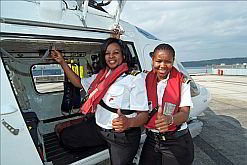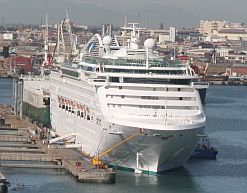
SA women marine pilots make history
Three South African women have set the standard in Africa by becoming the first black female marine pilots on the continent to gain open licences, enabling them to navigate ships of all sizes and types into local waters. Precious Dube, Bongiwe Mbambo and Pinky Zungu, who are three of only five female marine pilots in […]

Three South African women have set the standard in Africa by becoming the first black female marine pilots on the continent to gain open licences, enabling them to navigate ships of all sizes and types into local waters.

Precious Dube, Bongiwe Mbambo and Pinky Zungu, who are three of only five female marine pilots in South Africa, are tasked with guiding ships through dangerous or congested waters, such as harbours.
The marine pilot acts as an advisor to the captain, who maintains legal, overriding command of the vessel.
Tau Morwe, chief executive of Transnet National Ports Authority (TNPA), said: “The maritime sector used to be one that was closed off to the historically disadvantaged, including women, but this is changing and we are geared for even greater success stories than this.”

The three women are products of the TNPA’s development scheme, which has been encouraging more equitable participation in the maritime sector since the 1990s.
Transnet offers aspirant students bursaries to complete a national diploma in maritime studies – specialising in navigation, and a national diploma in marine mechanical engineering.
These courses can be taken at the Cape Peninsula University of Technology and the Durban University of Technology.
Rufus Lekala, chief harbour master in South Africa and the youngest in the world, said: “These women have put us on the map once more and should be very proud of their achievements.”
Winning the trust of sceptical captains
Dube, from Inanda in KwaZulu-Natal, was the first in the group to gain an open licence.
“The captains of foreign ships can be very sceptical when you’re a woman because it’s not common for them to see a female marine pilot; although I’ve heard there are a few in the US and possibly Australia,” she said.
Dube said she had to demonstrate her knowledge of the port to the male ship captains before they were confident of her ability to steer their vessels into and out of the harbour.
The two other women to qualify with an open licence have also shattered preconceptions and – in one case – even become somewhat of a spectacle.
Mbambo, originally from Esikhawini on the north coast of KwaZulu-Natal and now living in Glenwood in Durban, recalled how a ship captain actually video-recorded and photographed her while doing her job.
Zungu added: “Being at sea was difficult at first. I was the only cadet and the only female on a Russian cruise ship where only the captain spoke English well.”
Luckily, she eventually met another South African woman on board to whom she could relate.
“Today I love my job and can imagine myself still doing this at the age of 65,” she said.
Climbing the ranks
The group’s journey from cadet to master pilot was a lengthy one, involving many assessments and exams.
The women were part of Transnet’s one-year maritime programme and did practical at-sea training on shipping lines such as Safmarine and the Unicorn.
Training at sea was followed by an oral exam. Once they passed this, they became junior deck officers who auto-piloted vessels and managed safety equipment.
The next step was becoming tug masters and then, after another year’s course, junior pilots.
Becoming junior pilots enabled the trio to move up the ranks and through different grades until they reached their open-licence milestone.
Source: www.mediaclubsouthafrica.com
